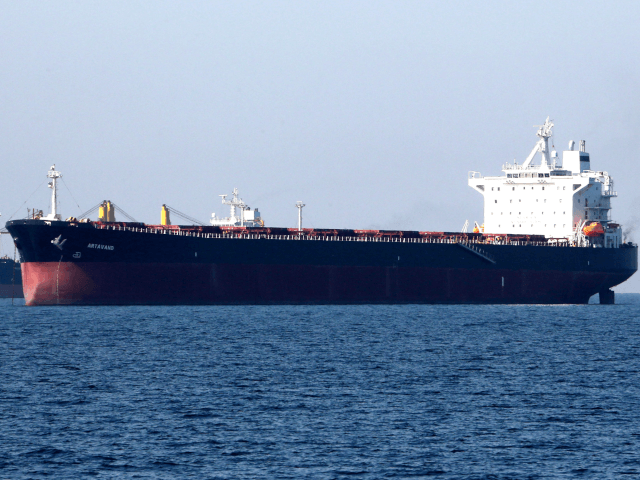A tanker allegedly filled with 130,000 tons of Iranian oil docked near the Chinese city of Zhoushan last week, concluding a four-month journey that may violate U.S. sanctions against Iran, depending on what happened to the cargo.
Reuters explained on Thursday that satellites tracked the tanker Marshal Z, beginning in January when it picked up the Iranian oil from another tanker off the coast of the United Arab Emirates. Ship-to-ship transfers at sea are a common tactic for evading sanctions.
The U.S. sanctions clampdown evidently made buyers uneasy about purchasing the oil because it was transferred between a few other ships before the Marshal Z took it back on March 22. The tanker spent the better part of two months anchored off the coasts of Singapore, Malaysia, and Hong Kong, and finally sailed to the Jinrun oil storage terminal on the Chinese island of Liuheng. After four days of offloading its cargo, the ship sailed for Singapore and is due to arrive on May 21.
Representatives of the company that runs the Jinrun facility denied the Marshal Z’s cargo was banned Iranian oil, but Reuters cited satellite data that shows the ship’s weight did not change from the day it picked up the oil in March until the day it arrived at Liuheng island, so the cargo could not have been dumped or traded before that.
The Jinrun facility provides bonded storage without clearing Chinese customs and officially bringing the cargo into mainland China, which might have some impact on whether the U.S. government cites a sanctions violation and takes action. Reuters was unable to determine who purchased the oil, or for that matter who owns the Marshal Z.
Analysts quoted in the report suggested the oil was discounted so steeply by desperate sellers that an unknown party decided to grab the irresistible bargain and risk U.S. retaliation.
China generally appears to be abiding by U.S. sanctions on Iran, at least when it comes to above-board purchases. Chinese companies canceled their purchases of Iranian oil in April after President Donald Trump chose not to renew the waivers granted to some of Iran’s biggest customers.
Before those cancellations were announced, Chinese media speculated Beijing might openly defy the sanctions, since Chinese officials were highly critical of President Trump’s decision and insisted their business with Iran should not be disrupted.
Global oil prices remain quite low, reducing the incentive for buyers to risk America’s wrath by secretly purchasing Iranian products at a discount. Some industry experts believe the trade war between the U.S. and China is slowing down the world economy and reducing demand, so prices could spike if the economic battle between Washington and Beijing ends this summer.

COMMENTS
Please let us know if you're having issues with commenting.